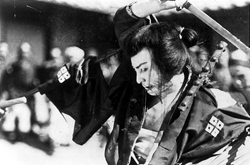
Running Time: 9 seconds
Compressed File Size: 1.2MB

OUTLINE
In July, 1925 Bando Tsumasaburo (known as Bantsuma) began
Bantsuma Productions, the first Japanese Independent
production company headed by a star. Orochi was its second
film. The film begins with an ominous warning:
Not all those who wear the name of villain, are truly evil
men. Not all those who are respected as noble men, are worthy
of the name. Many are those who wear a false mask of
benevolence to hide their treachery and the wickedness of
their true selves.
In the same year that this film was made, the Law for the Maintenance of Public Order was enacted. This law set severe penalties, including capital punishment, for anyone involved in activities related to national revolution or a repudiation of the system of private ownership of property. The law was written with extremely vague terms to give it a wide range of application. It was used extensively by the government to repress liberal performers and writers. The Law for the Maintenance of Public Order remained in place until it was repealed in 1945 by order of the Occupation forces.
1925 also saw the introduction of compulsory military training for all students in junior high school and above. After the relatively liberal and creative Taisho Period, which lasted a mere 15 years from 1912 to 1926, Japan was about to enter the darkness of Showa, an age that saw the rise of a national and military fanaticism that led Japan down the path of war to eventual defeat and destruction.
This film's protagonist, Heizaburo Kuritomi, is an honorable lower-class samurai, who despite his noble ideas, is rejected by the evil forces that dominate his society, Until the beginning of the 1920's, all period films followed essentially the same plot, which is standard in the films of Onoe Matsunosuke, the first star of Japanese cinema. The heroes of these films, proud samurai of the upper classes, inevitably prevail over their villainous opponents as they defend what is right.
Suzukita Rokuhei, who wrote Orochi's scenario, had a different message to convey. His film was a response to the changes that he saw happening around him in Japan, a cry in the dark against the forces of fascism and imperialistic authoritarianism.
During an interview for a contemporary film magazine Suzukita was quoted as saying the following:
"I have never thought of myself as socialist. What I say in my films is simply a reflection of the cries of the younger generation in our society,"In addition to the provocative ideology that underlines Orochi's story, the mere fact that it was the first major undertaking by the first independent production company founded in Japan lent this film a tremendous significance and imposed a great responsibility on the people who made it.
They were all very young, a group of young and rebellious spirits. Bantsuma, already the King of Cinema and head of his own production company, was 25 years old. Scenarist Suzukita and Director Futagawa Buntaro were also in their twenties and cinematographer Ishino Siezo was only 21. Tamaki Utako, who plays Namie, the woman Bantsuma loves in this film, told about the atmosphere surrounding the film.
"This film was a matter of life and death for us. We had just left Makino Productions. We had no money, We had to shoot most of the scenes outside because we didn't even have a studio to shoot in. We knew that if we failed at this it would be very difficult for others to create their independent companies. Bantsuma kept us going through the whole thing."Naturally, with all these rebellious ideas, the film did not make it past the censor's scissors unscathed. Over 20 percent was cut outright. Many scenes were ordered to be reshot. Even the title, which was originally set at Scoundrel, was rejected and in its place Orochi, which has no inherent meaning, was selected. Still, director Futagawa Buntaro asserted that:
"It was a very exciting time for both Bantsuma and myself. We threw ourselves into this film and despite all the cuts, we remained faithful to the image that Rokuhei had conceived."When Orochi was released it caused a stir greater than even Bantsuma had imagined. Crowds thronged to see it in theaters around the country. Although there were many who came mainly to see the new, fast-paced sword fighting style that Bantsuma displays in it, there were also many who were moved by the film's deeper message.
We are very fortunate to be able to see this film in nearly perfect condition. The vast majority of silent Japanese films have been lost or remain in only fragmentary form. However, Orochi is one of the only Japanese silent films for which the original negative has been preserved. This is not the result of mere luck. Of the over 200 films in which he appeared, Bantsuma kept only the negative for Orochi That in itself is indicative of the value that he placed in this film.
The benshi (narrator) performance on this film was done by the late Matsuda Shunsui. Fortunately, before his death, Mr. Matsuda completed recorded versions of his benshi performance on over forty silent works. Undoubtedly, Orochi was one of his favorite films, The English subtitles in this film are based on Matsuda's commentary.

|
Download an excerpt of the movie in QuickTime format! Running Time: 9 seconds Compressed File Size: 1.2MB |
![[Matsuda company logo]](../images/matsuda_base.gif)